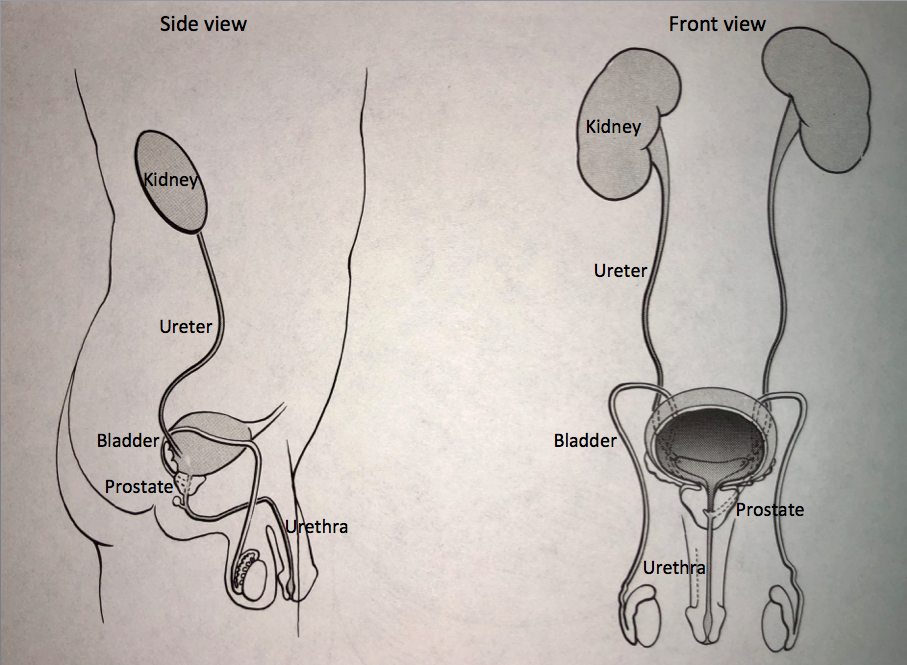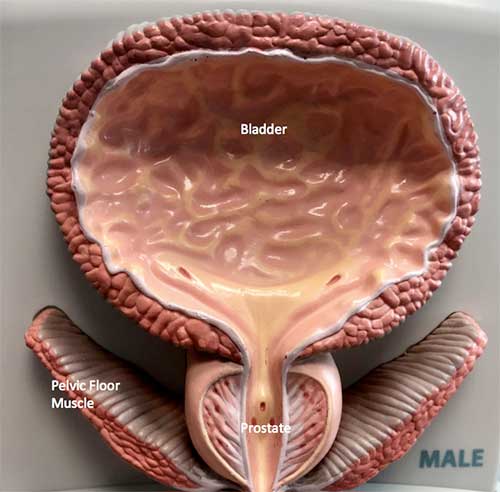Bothersome Urination in Men
Many men are troubled with urinary frequency and urgency, which means they need to urinate too often, and, when they have to go, they have to get there right away. Also, they notice they need to urinate too often at night.
I have to go too often, I have to get there right away, and I am up too much at night”
How is the urinary system put together? How does the prostate change?
To understand why these changes develop, and to understand how they are treated, it helps to know how the urinary system works. The kidneys in the back make the urine that runs through tubes to the bladder. The bladder’s job is to hold urine until full, then empty to the outside through urinary pathway (the urethra) the first part of which is the prostate.

When men are 20 years old, the prostate is normal in size and the urinary pathway is wide open. When men reach 40, the prostate begins to enlarge and block the pathway that makes it more difficult for the bladder to push urine to the outside.
It is useful to recognize that the bladder has two jobs. First – store urine. Second – empty urine to the outside. When men are past 40, the bladder has trouble with both functions.
Why do men get frequency and urgency?
When symptoms of urinary frequency and urgency develop, it represents the inability of the bladder to store urine with ease. There are usually two reasons that occurs- age related loss of bladder wall elasticity, and blockage of the urinary pathway by the prostate.

First, the bladder changes. It becomes less elastic after age 40. When the bladder is less elastic it does not store as well (it can’t hold as much, or to say it another way, it has a smaller storage capacity). It has to empty more often. Also, as the bladder becomes less elastic, when it reaches its capacity (the maximum amount it can hold), it cannot continue to expand further (as it could when it was more elastic). When the less elastic bladder can stretch no further, it wants to empty, and that is when a man notes that he feels the urge to go and finds it difficult to postpone urination.
Second, the prostate enlarges and blocks the pathway. As the prostate blocks the urinary pathway, the bladder muscle has to work harder to push against the blockage. When the bladder muscle works harder against resistance, it becomes thicker, which is another reason that it becomes less elastic.
Sometimes, the bladder does not empty completely, and there is post void residual, which is urine left behind after the bladder makes its effort to empty. When the post void residual volume increases, the amount of space available to store additional urine decreases, so the actual “working” capacity of the bladder is diminished.
A question men often ask is: “does the enlarged prostate push up into the bladder and take up space so that the bladder capacity is less?“ Interestingly, even as the prostate gets bigger, it does not take up that much space inside the bladder, so that is not the reason the bladder holds less. Rather, as already explained, the bladder holds less urine because it is less elastic, and it may have higher post void residual.
How are frequency and urgency treated?
When men are bothered by frequency and urgency, often both parts of the problem need to be addressed.
First, the obstruction by the prostate should be addressed. Different types of drugs are available, such as tamsulosin (flomax) which opens the pathway, and finasteride (proscar), which reduces the size of the prostate. When pills are not enough to relieve blockage, procedures are used to open the pathway, including the greenlight laser and urolift. The ways to treat blockage caused by the prostate are discussed in our BPH newsletter.
When the obstruction is lessened, the bladder does not have to work as hard to push the urine out, and it may become less thickened and regain some of its elasticity. There may also be an increase in the “working” capacity of the bladder if there is less post void residual.
Second, the reduced bladder storage needs to be addressed as well. There are a variety of different techniques available to help improve bladder storage, to lessen the symptoms of frequency and urgency (those drugs and techniques are addressed in our overactive bladder newsletter.)
There are times when a man receives treatment for the blockage of the urinary pathway caused by the prostate, and the obstruction issue is resolved, and yet he may still have bothersome frequency and urgency (because the bladder has changed and lost its elasticity). In that case, he can need additional treatment directed to the bladder to help improve storage and lessen frequency and urgency.
What about “having to Go” so much at night?
Finally, when it comes to getting up too much to urinate at night, there is a third part of the story. As detailed in our nocturia newsletter, the body changes the way it handles fluid after age 40. Fluid builds up in the body during the day, and then the kidneys get rid of that excess fluid at night. At the same time as the kidneys make more urine overnight, bladder storage capacity is lessened, all of which adds up to the outcome that a man needs to get up to urinate more frequently during the night. There may be occasions when the obstruction has been addressed, and the bladder storage issue has been addressed, and yet a man is still up often at night to void because of the extra amount of fluid that the kidneys make.
Take Home Message
One of the goals of treatment is to help patients achieve insight into these concepts of obstruction, loss of bladder elasticity, and increased urine volume production at night, because understanding these concepts allows recognition of the roles of the different types of treatments that are used in an effort to help patients lessen the bother associated with age related changes in urination.
Contact us to request an appointment or ask a question. We're here for you.


